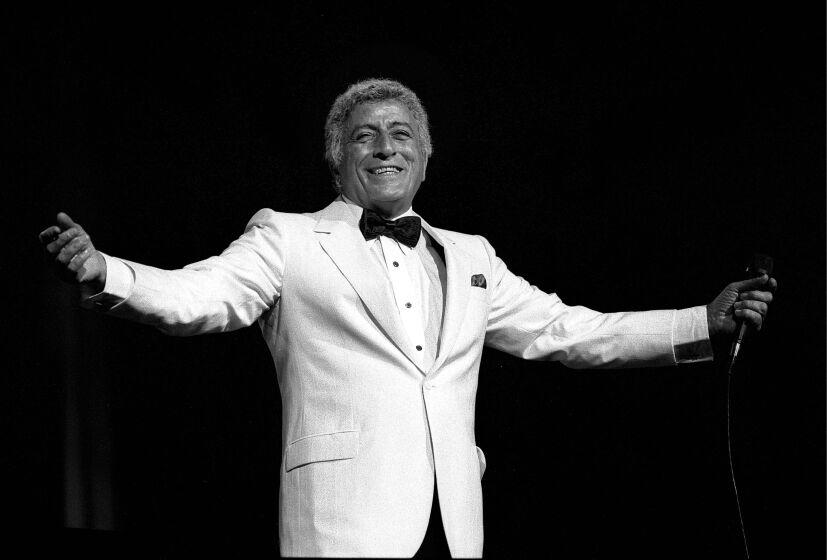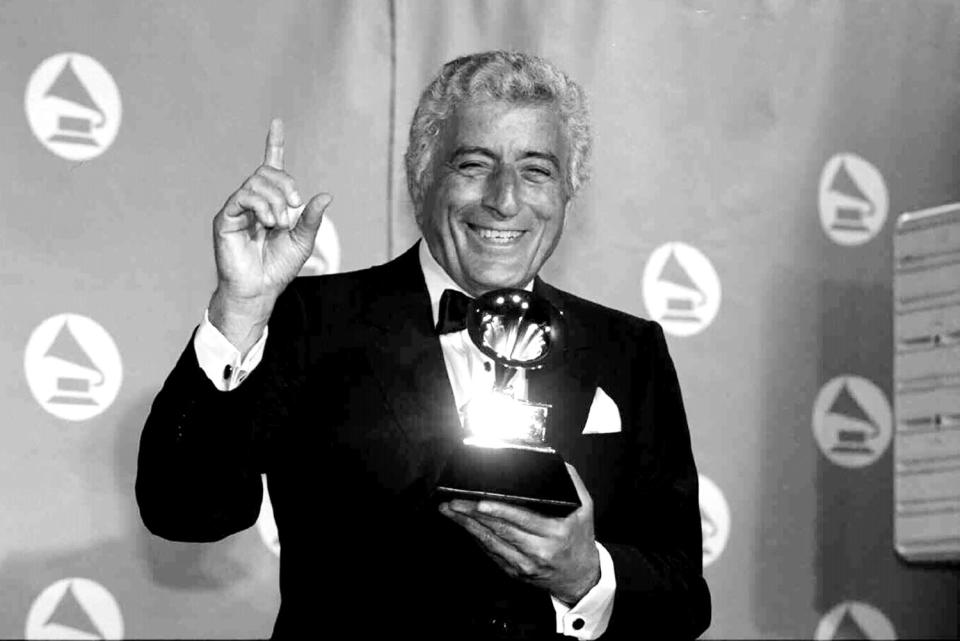Across generations, the irrepressible joy of Tony Bennett could never be unplugged

- Oops!Something went wrong.Please try again later.
- Oops!Something went wrong.Please try again later.
Can a singer smile with his voice? Tony Bennett sure could.
As instantly identifiable as any in pop music, Bennett’s voice was a source of warmth and welcoming, of quick wit and steady wisdom — a musical grin that kept beaming over the course of a career that stretched across seven decades. He sang seemingly effortlessly, coasting just above life’s troubles, but not so smoothly that you believed he’d somehow avoided the rough stuff. And though it evolved subtly with age — a promise of romantic intimacy giving way to a sense of grandfatherly companionship — his voice didn’t really change to match what was going on in the world around it.
When I asked him a few years ago about the secret of his success, he chuckled and said, “I never did disco” — though in truth he probably could’ve done it with class.
Read more: Tony Bennett, timeless singer who won over fans for decades, dies at 96
Bennett, who died Friday at age 96 — just a year after he won a Grammy, his 20th including a lifetime achievement award, for an album of duets with Lady Gaga — was perhaps pop’s most prominent surviving devotee of the trove of pre-rock tunes, many from Broadway and the movies, known as the Great American Songbook. That album with Gaga, 2021’s “Love for Sale,” was a collection of Cole Porter standards; not long before that came tributes to the music of Jerome Kern and George and Ira Gershwin. Yet Bennett’s infectious charm — the joy he still found in performing songs he’d sung hundreds (or thousands) of times — gave him a timeless appeal irresistible to fans from any number of generations after his.
Listen, if you haven’t in a while, to the ebullience of his vocal in “Rags to Riches,” which he cut in 1953 and which Martin Scorsese revived decades later for the opening sequence of “Goodfellas”: Has any man ever sounded happier describing his empty pockets and his torn and tattered clothes? In “The Good Life,” he’s dispensing advice about heartache with so much reassurance in his voice that you’re almost tempted to experience it in order to come to him for help.
“I Left My Heart in San Francisco,” Bennett’s signature song despite his roots in working-class New York, lays out a vision of loneliness slowly brightened by his encouraging croon. Then there was his stately rendition of — what else? — Charlie Chaplin’s “Smile,” a Hollywood bromide in which he found true emotional value.
Read more: 'He's irreplaceable': Tony Bennett remembered by Elton John, Billy Joel and other celebs
He could think expansively about whose work belonged in the canon; one early hit was his take on Hank Williams’ country weeper “Cold, Cold Heart,” which he characteristically buoyed with a sense that eventually he’d figure out how to free a woman’s doubtful mind. But even when he ventured a bit too far in terms of repertoire — think of 1970’s “Tony Sings the Great Hits of Today!” with its garish hippie-fied cover and its schmaltzy covers of “MacArthur Park” and “Eleanor Rigby” — Bennett’s singing retained its dignified cheer.
Along with the business savvy of his son Danny, who began managing his father’s career in the 1980s, that quality is what kept Bennett afloat into the alt-rock and hip-hop ’90s, when he famously appeared with the Red Hot Chili Peppers on the MTV Video Music Awards and shot an episode of the network’s “Unplugged” series whose accompanying album went on to win a Grammy for album of the year.

Alex Coletti, a veteran TV producer and director who oversaw “Unplugged,” told The Times he remembers discussing the possibility of having Bennett sing something contemporary on the show.
“There was a thought: Can Tony do a Chili Peppers song?” Coletti said. “Danny instantly put the brakes on that. He’s like, ‘No, no, no, no — he’s not doing “Under the Bridge.” You want Tony to do Tony.’ And he was absolutely right.” (MTV did have J Mascis of Dinosaur Jr. and the Lemonheads’ Evan Dando join Bennett during the taping, Coletti revealed, though their performances didn’t make the final edit.)
What Danny Bennett understood is that his father — a singer for whom simplicity was key to his delivery — still made sense to an audience that like any just wanted to be moved. The elegance of his approach attracted A-list duet partners in the years after “Unplugged” — Barbra Streisand, Paul McCartney, Willie Nelson, Aretha Franklin, Celine Dion, Stevie Wonder, Bono and Amy Winehouse, among many others — all of whom were drawn to Bennett because he gladly played the straight man, giving each of them ample room to do their thing.
He struck up what turned out to be a fruitful collaboration with Lady Gaga when the two sang “The Lady Is a Tramp” on 2011’s “Duets II” album; it’s a kick to hear her crack him up with her over-the-top ad-libs and screwball-comedy accent. They went on to cut “Cheek to Cheek” in 2014 and tour together the next year before reuniting for “Love for Sale,” which earned another album of the year Grammy nod.
His last public performance came right around the time of “Love for Sale’s” release, when he and Gaga played New York’s Radio City Music Hall in a concert that became a TV special that Coletti directed. By this point Bennett had been grappling for five years with Alzheimer’s disease, which made certain everyday parts of his life difficult — except, many around him have said, for performing.
Coletti described the rehearsals for the Radio City gig as “touch and go, quite honestly.” But at showtime, he added, “when that curtain went up and he saw that audience and the love he got, he was 100,000% there. It was stunning.”
As usual, Tony Bennett was making people happy — and vice versa. Said Coletti: “He would have stayed out there all night if we’d let him.”
This story originally appeared in Los Angeles Times.

